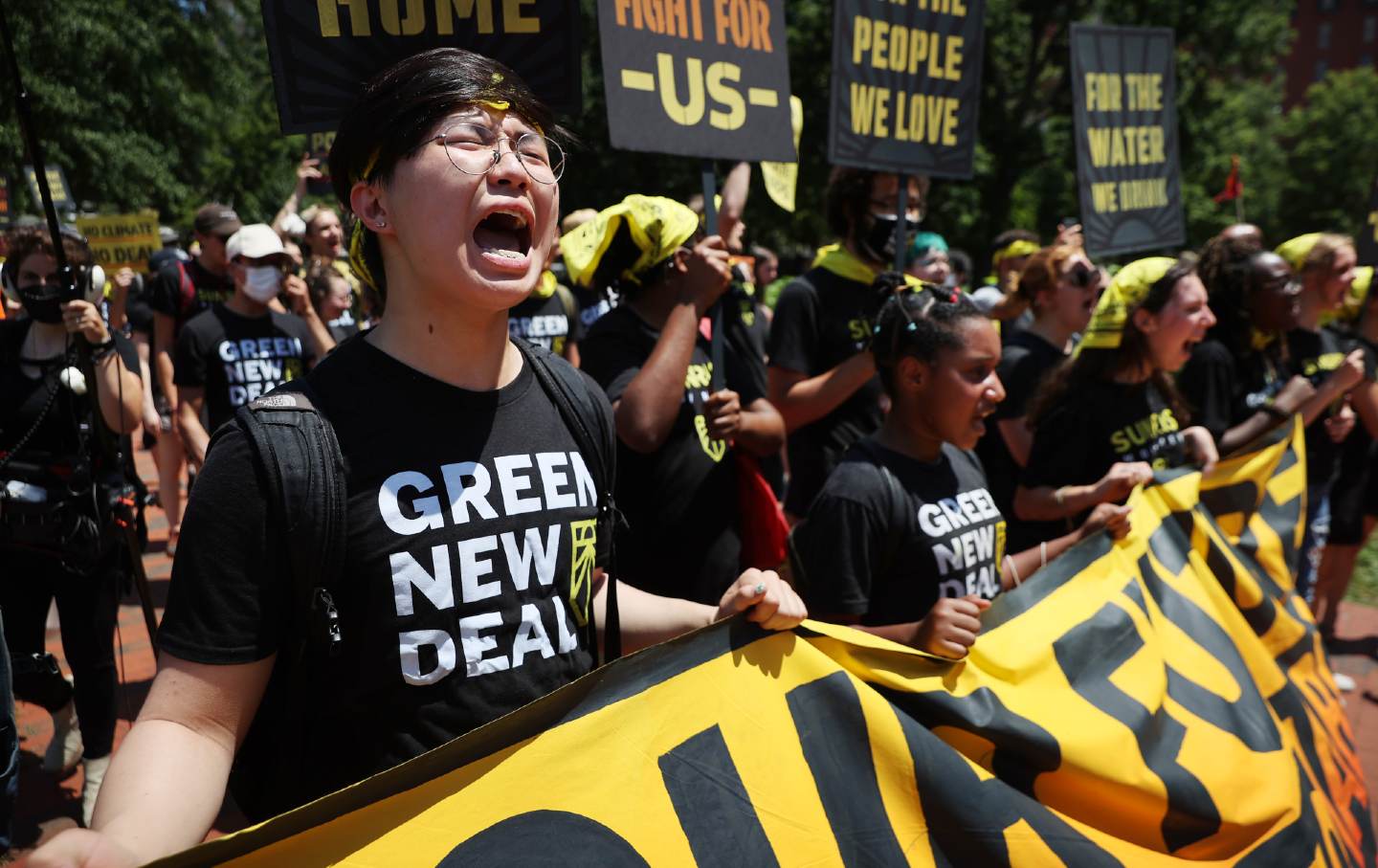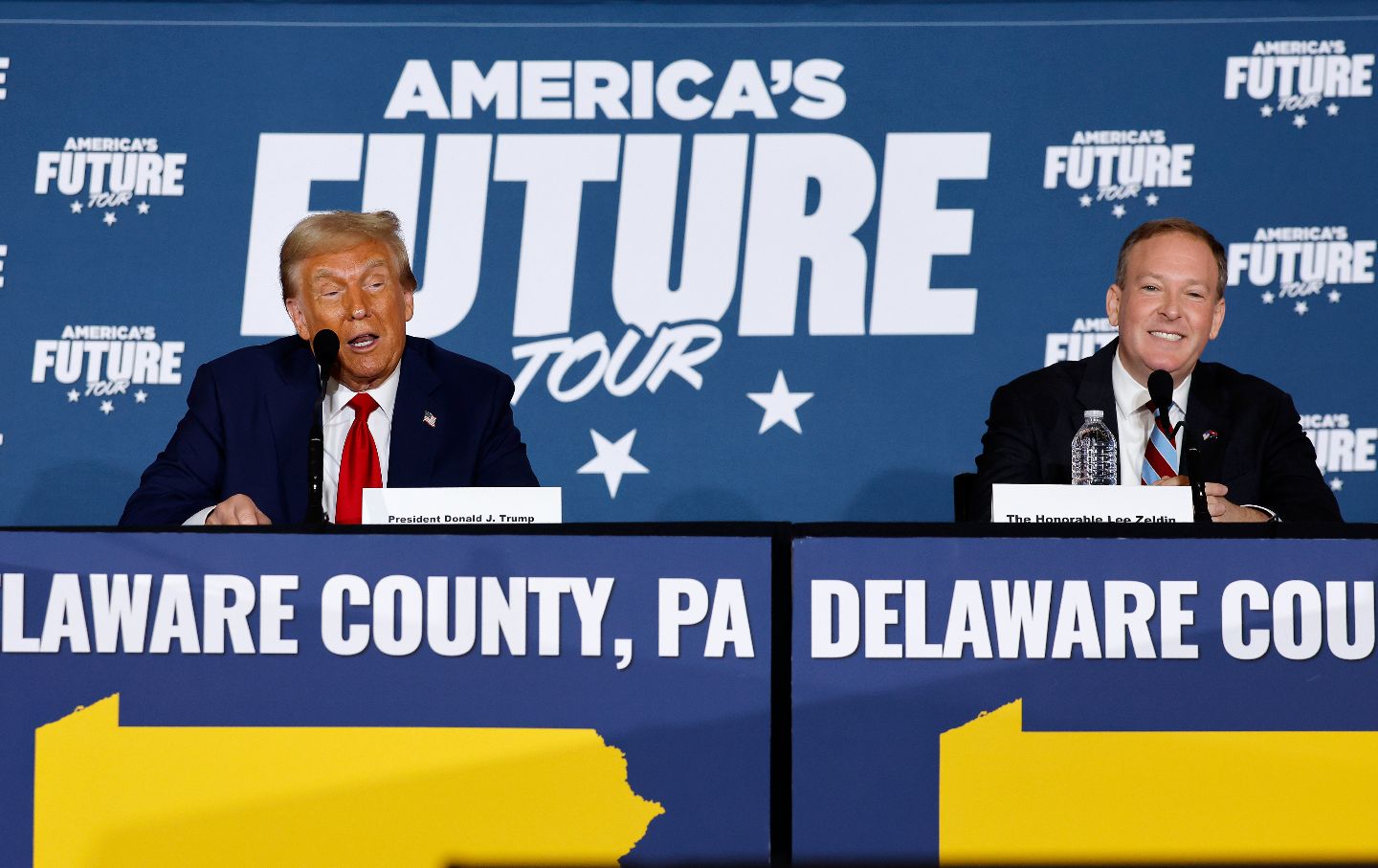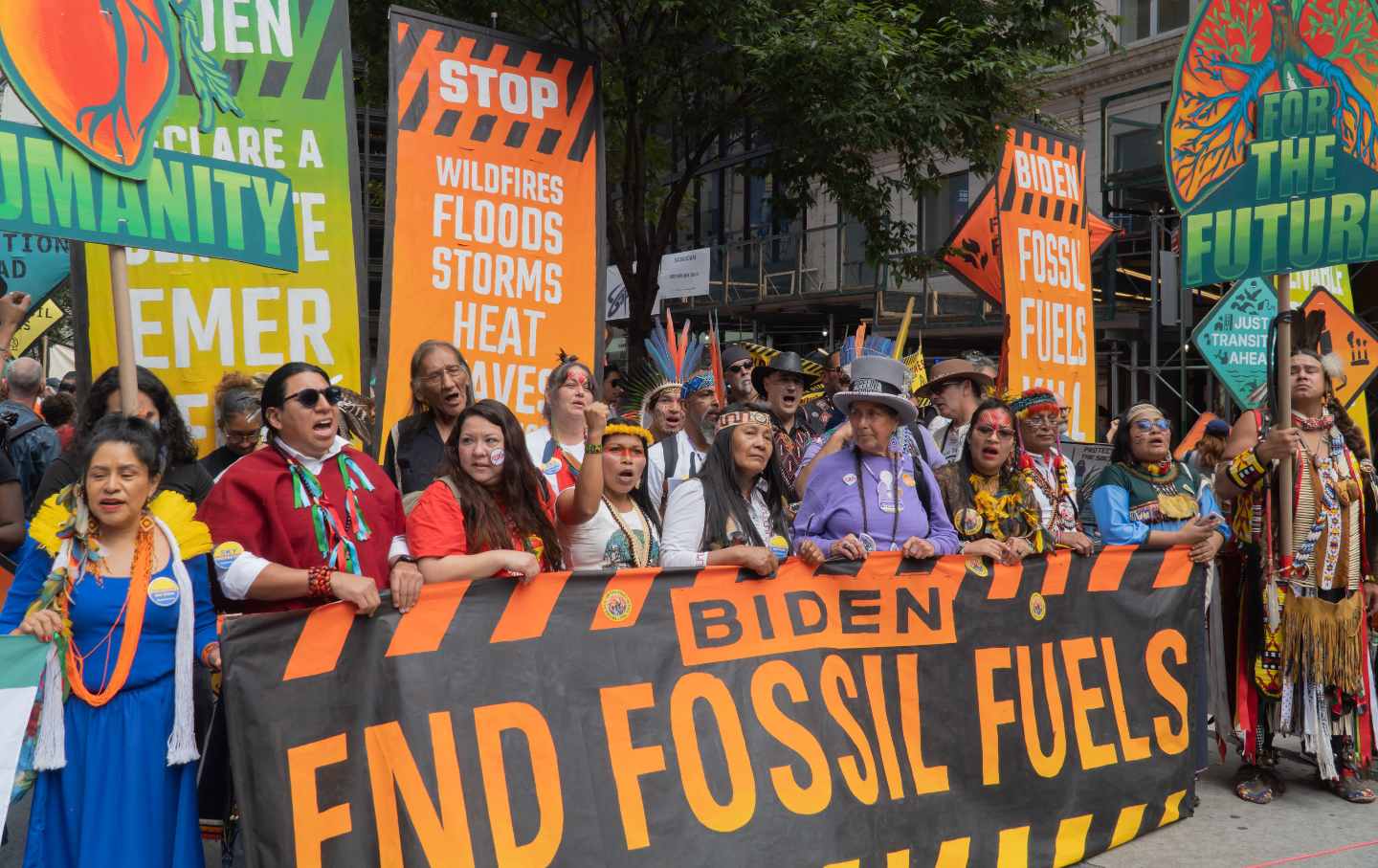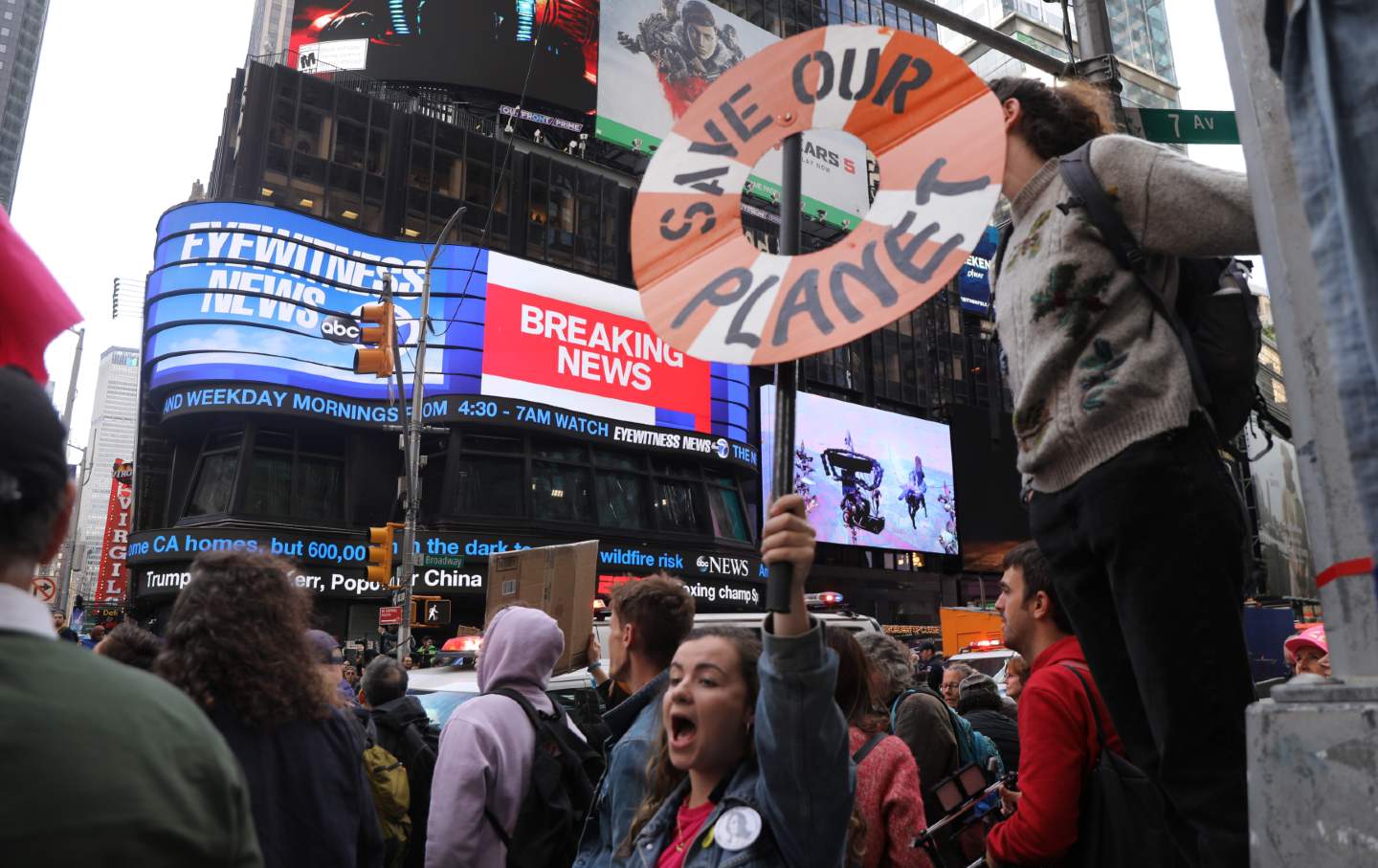Can Video Games Help Us Beat Climate Change?
The $160 billion industry has a massive carbon footprint, yet climate organizations are increasingly recognizing video games as an avenue for education and impact.

A game controller at the EA Sports NHL23 World Championships on June 27, 2023, in Nashville, Tennessee.
(Eliot J. Schechter / Getty)
For climate activist and incoming university senior Amelia Southern-Uribe, video games have always provided a crucial escape from the real world. Yet, as the climate crisis continues to accelerate and young people’s climate anxiety soars, games have begun to offer something else: a feeling of agency that can often feel out of reach in reality, where aging policymakers and profit-seeking corporations often ignore young people’s calls for climate action.
The connection Southern-Uribe makes between climate activism and their passion for gaming provides a window into a growing and potentially impactful social phenomenon. A journal article from May titled “Geeks versus climate change: understanding American video gamers’ engagement with global warming” suggested that video games can provide a forum for climate change communications, in part because gamers are often already or more willing to get on board with the climate movement.
Video games are increasingly being recognized as an avenue to inspire everyday players to hold their communities, the gaming industry, and national governments accountable in confronting the climate crisis. A national survey found a positive association between playing video games and intending to take collective climate action. These findings were consistent even after controlling for confounding variables including age, political party, and attitudes toward global warming. And while gamers are often stereotyped as male and misanthropic, they’re actually a diverse demographic, encompassing a majority of adults in the United States.
As a nearly $160 billion global industry, video games are not known for sustainability. One 2019 study put its carbon footprint on par with the carbon dioxide emissions of over 5 million cars in the United States alone. In California, a 2015 study of homes found that the amount of electricity that went to computer gaming equaled the combined amounts for dishwashing machines and freezers. The industry also has faced criticism for its connections with the US military—the world’s single largest institutional source of greenhouse gasses—which has used gaming platforms as a vehicle for recruitment.
Yet many climate organizations and gaming industry members have recognized video games as a tool for education and activation around social good. In recent years, United Nations initiatives including the United Nations Environment Programme (UNEP) and United Nations Development Program (UNDP) have partnered with game developers to engage gaming audiences around sustainable development goals and, specifically, combating climate change. The UNEP-backed initiative Playing for the Planet unites game companies and organizations to advance environmental action through video gaming. Such efforts include an annual competition called the Green Game Jam, which last year involved over 40 game studies and raised over $700,000 for wildlife protection, and is set to involve 80 games and target over 1 million players for 2024.
PlanetPlay, a non-for-profit initiative “dedicated to reversing the climate crisis through the power of people and technology,” provides valuable data both for UNDP to understand what climate policy changes people might want and for socially good-minded game developers to understand what gaming experiences most engage their players, according to Jude Ower, PlanetPlay’s chief strategy officer. “It gives studios and the industry a much clearer way to activate, rather than it being, you know, shooting in the dark,” said Ower.
Following a year of record growth in conscious consumerism, or consumers’ desire and willingness to pay more for ethical products, and with a majority of people wanting their governments to take climate action according to UN polling, it should come as no surprise that video game players are looking for games that engage them environmentally.
A 2022 survey by Playing for the Planet Alliance involving nearly 390,000 game-playing respondents found that over 80 percent desired green messages in their games. Over two-thirds of respondents said they would also consider making environmentally sustainable lifestyle changes, indicating a predisposition to climate action, but 10 percent more respondents answered this way after playing games with green messaging, demonstrating that such messaging can inspire at least a stated commitment to green behavioral change. The “Geeks versus climate change” article further suggests a positive relationship between playing games with climate content and players expressing an intent to take collective actions on climate change.
That broadened conception extends to game developers. Jonathan Hau-Yoon, lead artist on the environmental strategy game Terra Nil and game developer at Free Lives, isn’t an avid hiker like their Terra Nil co-creator. Still, Hau-Yoon found themself distressed by environmental and climate disaster. Developing and playing Terra Nil, which centers around caring for the environment and donates a portion of its proceeds to wildlife conservation, provided an antidote. “The feeling of agency, the feeling that I could do something about it, was very calming,” said Hau-Yoon.
Whereas some games like Terra Nil may inspire players with environmental themes without deliberate educational aims, other games are employing targeted messaging and activation strategies around climate change. In 2022, the company Ubisoft staged a first-ever virtual Climate March in Riders Republic Rebirth following its participation in the previous year’s Green Game Jam. This past April, Pokémon Go provided in-game incentives for players to spend time outdoors during its annual Sustainability Week, including through 500 meetups focused on cleaning up local parks, as part of a broader Earth Day-focused initiative by parent company Niantic that saw over 3.4 million players participate.
“Games help us imagine and visualize the world we might want to build in our climate-disruptive future and…the situations that we want to avoid,” said Marina Psaros, article coauthor and senior adviser at the Atlantic Council, who noted that the control games provide attract gamers. “You’re not just an idle consumer [when playing]…so I think that games are totally right for people learning new information and skills and then taking action on them.”
Popular
“swipe left below to view more authors”Swipe →One popular form of climate activation is in-game consumer spending on what are called green assets. These assets often include coin or gem packs, where a percentage of the revenue generated by players is donated directly to green projects or used by developers to buy carbon credits. Such credits, however, are often criticized by climate scientists and activists for providing a false sense that emissions can simply be ‘offset’ and failing to actually stop them at their source.
Last year, for instance, the popular mobile game Subway Surfers partnered with PlanetPlay and music artist J. Balvin to create a Balvin character; a portion of the proceeds from character-related in-game purchases supported what they branded as carbon offsetting—a clean cookstoves initiative in Kenya.
While the next Green Game Jam will include an explicit ask for participating game developers to “rally their players to take action in the real world for the environment,” it’s unclear whether games can really motivate such action, at least in a way that goes beyond short-term game playing and involves collective efforts to make change. Especially given the lack of data around this question, translating in-game climate messaging into concrete action remains an ongoing challenge—and one that involves confronting a much broader attitude-behavior gap on climate change. Going forward, conducting follow-up surveys with initial respondents could help answer whether game players who espouse commitments to personal sustainability or consider taking climate action post-games, for instance, actually follow through on their green intentions. Players could also be explicitly asked whether they felt inspired by a game to take such action.
For players engaging with the climate crisis in gaming, “the next level up in your journey would be to stitch together the in-game and out-of-game selves…and really try having some sort of real world impact…by following your concerns and your values,” said Psaros. She suggested that gamers pursue alternative energy options for their gaming—including by taking advantage of state and federal loan programs, tax credits, and other initiatives designed to help homeowners go green. Ideally, she added, players would also feel motivated to get involved in local climate policy and planning decisions.
Yet, as Psaros highlighted, emphasizing sustainability and climate action in games isn’t about shifting responsibility onto consumers, especially amid pervasive fuel-powered grids. Consumers seem to share this understanding. A majority of video gamers in a 2022 national survey by the YPCCC and the real-time 3D content company Unity reported believing that the gaming industry is responsible for taking climate action even as individuals make mindful choices of their own.
Such responsibility entails reducing the energy intensity of games developed, seeking to reduce emissions involved in game production by switching energy sources to greener alternatives, and supporting the expansion of renewable energy more broadly so that players have options. Already, some game and gaming platform developers are moving in this direction; Microsoft, for instance, has altered the Xbox, including reducing the power consumption per unit of performance, in order to reduce its carbon footprint, while games like Known Mysteries are using compressed video footage and lower-resolution graphics to minimize the energy usage required to play.
“I think a lot of game studios now are savvy to the fact that players want to do something good, especially around the planet, and [are thinking] if you’re not doing it, is that bad for business? So you better do something good and do it in the right way,” said Ower.
While global temperatures climb and pressure on corporations and policymakers to act continues to build, Carman hopes that those “who care about climate and play video games feel empowered to recognize that they are part of the movement and…that the climate movement recognizes that [it] is for everybody.”
For her part, Psaros hopes their research will help climate communicators and entertainment makers expand the climate conversation in all its complexities. Games offer “low-risk, make-believe spaces to have conversations about the trade-offs we need to make and the solutions that we need to actually put into place,” she said. “It can be a lot easier to have those conversations in a game environment than in a planning commission meeting.”
Southern-Uribe also highlighted the value of video games for expanding people’s imagination around climate change concepts that are difficult to grasp: “No matter what situation you’re in, you still imagine and find a solution to your position in the game.”
We cannot back down
We now confront a second Trump presidency.
There’s not a moment to lose. We must harness our fears, our grief, and yes, our anger, to resist the dangerous policies Donald Trump will unleash on our country. We rededicate ourselves to our role as journalists and writers of principle and conscience.
Today, we also steel ourselves for the fight ahead. It will demand a fearless spirit, an informed mind, wise analysis, and humane resistance. We face the enactment of Project 2025, a far-right supreme court, political authoritarianism, increasing inequality and record homelessness, a looming climate crisis, and conflicts abroad. The Nation will expose and propose, nurture investigative reporting, and stand together as a community to keep hope and possibility alive. The Nation’s work will continue—as it has in good and not-so-good times—to develop alternative ideas and visions, to deepen our mission of truth-telling and deep reporting, and to further solidarity in a nation divided.
Armed with a remarkable 160 years of bold, independent journalism, our mandate today remains the same as when abolitionists first founded The Nation—to uphold the principles of democracy and freedom, serve as a beacon through the darkest days of resistance, and to envision and struggle for a brighter future.
The day is dark, the forces arrayed are tenacious, but as the late Nation editorial board member Toni Morrison wrote “No! This is precisely the time when artists go to work. There is no time for despair, no place for self-pity, no need for silence, no room for fear. We speak, we write, we do language. That is how civilizations heal.”
I urge you to stand with The Nation and donate today.
Onwards,
Katrina vanden Heuvel
Editorial Director and Publisher, The Nation
More from The Nation

The Green New Deal—From Below The Green New Deal—From Below
It’s a base for countering Trump’s destructive policies.

The “Dark Joke” of Having a Climate Summit in Azerbaijan The “Dark Joke” of Having a Climate Summit in Azerbaijan
COP29 in Baku reveals the contradictions of having climate negotiations in a petro-state.

Why Trump Picked Lee Zeldin to Lead the Environmental Protection Agency Why Trump Picked Lee Zeldin to Lead the Environmental Protection Agency
With a Republican majority in Congress and Zeldin promising to “deregulate” the EPA, the new Trump administration will prioritize fossil fuel interests over environmental protecti...

Climate Realism (Still) Means Climate Justice Climate Realism (Still) Means Climate Justice
An interview with Tom Athanasiou on where climate geopolitics goes from here, and why unlocking trillions in climate finance is an “existential necessity.”

Anti-Protest Laws Won’t Silence Climate Activists Anti-Protest Laws Won’t Silence Climate Activists
Still, punitive measures against climate protest are reaching new extremes.

Journalists Must Rethink Our Fear of Taking Sides Journalists Must Rethink Our Fear of Taking Sides
The media often acts as if identifying threats or naming falsehoods are acts of partisanship. They are not. They are journalism.


